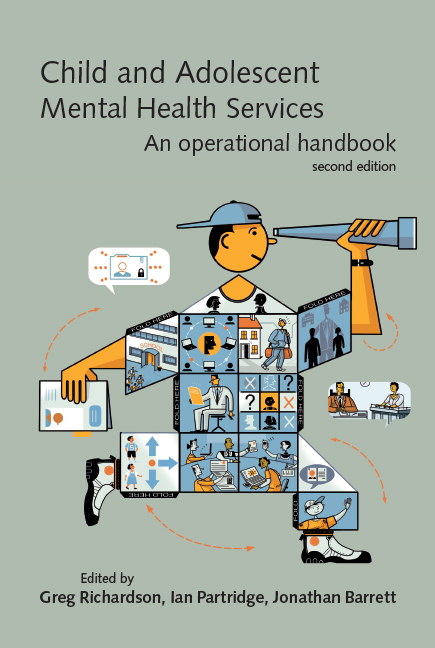Book contents
- Frontmatter
- Contents
- Tables, boxes and figures
- Contributors
- Abbreviations
- Preface
- 1 Introduction
- 2 CAMHS in context
- 3 CAMHS and the law
- 4 Structure, organisation and management of CAMHS
- 5 Evidence-based practice
- 6 Clinical governance
- 7 Education, supervision and workforce development
- 8 Multidisciplinary working
- 9 User and carer participation and advocacy
- 10 A comprehensive CAMHS
- 11 Referral management
- 12 Demand and capacity management
- 13 Strategies for working with Tier 1
- 14 Structuring and managing treatment options
- 15 CAMHS in the emergency department
- 16 Paediatric liaison
- 17 Self-harm
- 18 Learning disability services
- 19 Services for autism-spectrum disorders
- 20 Attentional problems services
- 21 Eating disorder teams
- 22 Bereavement services
- 23 CAMHS for refugees and recent immigrants
- 24 CAMHS and looked-after children
- 25 Drug and alcohol teams
- 26 Parenting risk assessment service
- 27 Court work
- 28 Tier 4 options
- 29 In-patient psychiatric care
- 30 Forensic services
- 31 Neuropsychiatry and neuropsychology services
- 32 Mental health provision for deaf children: study of a low-incidence service provision
- 33 Chief Executives – what do they want and how do they get it?
- Index
31 - Neuropsychiatry and neuropsychology services
- Frontmatter
- Contents
- Tables, boxes and figures
- Contributors
- Abbreviations
- Preface
- 1 Introduction
- 2 CAMHS in context
- 3 CAMHS and the law
- 4 Structure, organisation and management of CAMHS
- 5 Evidence-based practice
- 6 Clinical governance
- 7 Education, supervision and workforce development
- 8 Multidisciplinary working
- 9 User and carer participation and advocacy
- 10 A comprehensive CAMHS
- 11 Referral management
- 12 Demand and capacity management
- 13 Strategies for working with Tier 1
- 14 Structuring and managing treatment options
- 15 CAMHS in the emergency department
- 16 Paediatric liaison
- 17 Self-harm
- 18 Learning disability services
- 19 Services for autism-spectrum disorders
- 20 Attentional problems services
- 21 Eating disorder teams
- 22 Bereavement services
- 23 CAMHS for refugees and recent immigrants
- 24 CAMHS and looked-after children
- 25 Drug and alcohol teams
- 26 Parenting risk assessment service
- 27 Court work
- 28 Tier 4 options
- 29 In-patient psychiatric care
- 30 Forensic services
- 31 Neuropsychiatry and neuropsychology services
- 32 Mental health provision for deaf children: study of a low-incidence service provision
- 33 Chief Executives – what do they want and how do they get it?
- Index
Summary
‘… good practice requires not simply the collection of test data and observation, but the interpretation of these data in the context of age, developmental stage, injury/insult severity, and psychosocial context.’
Vicki Anderson (2002)What are neuropsychiatry and neuropsychology?
We have come to appreciate the biological underlay to mental health over the past 30 years; the extent to which central nervous system dysfunction, whether innate or acquired, affects mental functioning in ways that range from a varied mix of intellectual deficits through to altered emotion, behaviour and motivation. Clinicians have moved towards models that see disorder as the result of an interaction between brain biology and the environment, dumping the tabula rasa and the nature–nurture dichotomies with concepts such as ‘endogenous’ and ‘reactive’.
This shift in thinking has brought neuropsychiatry and neuropsychology into their own, focusing on the dysfunction in the brain as the origin from which psychological difficulties stem both directly and also indirectly from its interaction with the environment. The dysfunction has an immediate, direct effect on the way a child thinks and feels. However, it also will affect those around the child, which, in turn, shapes their response. The upshot is a complex, ever-changing mix of factors that will determine the child's vulnerability to environmental stress. For example, a child might start with a specific difficulty in processing spoken language which leaves them struggling to understand what people are saying to them; a difficulty that goes unrecognised as their speech sounds fluent. The child's apparent inattentiveness is irritating, making those around impatient and leading them to treat the child as if there is a learning disability. The child gets a sense of failure, a resentful disregard for rules, and diagnoses of ADHD and conduct disorder. Management requires that these interacting issues are teased apart; something that can take high-level, cutting-edge psychometry by more than one discipline: it will need the skills of a speech and language therapist in addition to those of the neuropsychologist and psychiatrist. This is biological psychiatry at its most florid and, to treat children effectively, their clinicians not only need to understand what is happening but also must have a knowledge of the limitations as well as of the utility of potential therapies.
- Type
- Chapter
- Information
- Child and Adolescent Mental Health ServicesAn Operational Handbook, pp. 293 - 300Publisher: Royal College of PsychiatristsFirst published in: 2017



